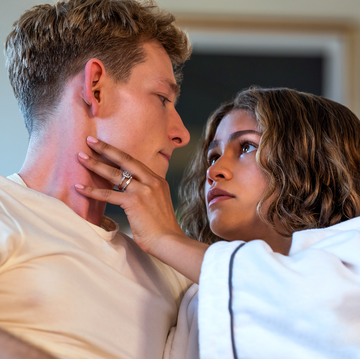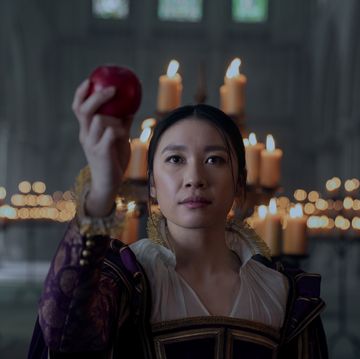We’re in the midst of an Indigenous awakening in entertainment, and all eyes are on Blackfeet actress Lily Gladstone as she continues to break glass ceilings. Throughout her historic awards season run this past year, she not only received accolades for her performance in Killers of the Flower Moon, but also used her platform to highlight another Indigenous film, the indie drama Fancy Dance, in which she also stars. While accepting one award, Gladstone called the project “the absolute highlight of my career and the best work I’ve ever done,” and pointed out that it still lacked a distributor. And while being honored at ELLE’s Women in Hollywood event, she invited her Fancy Dance collaborators at her table and shouted them out in her speech. Now, a year after its debut at Sundance Film Festival, Fancy Dance finally has a distributor (Apple Original Films) and is headed for theaters and streaming.
Written and directed by Seneca-Cayuga creative Erica Tremblay (whose credits include Reservation Dogs and Dark Winds), the movie highlights the Missing and Murdered Indigenous Women crisis with a story that’s as heartwarming as it is heartbreaking. Gladstone plays Jax, who in the aftermath of her sister’s disappearance steps up as auntie—an important role in many Native cultures—to Isabel Deroy-Olson’s Roki.
“Fancy Dance is one of those stories that just insisted upon itself, and it came along on the timeline that it wanted and found the home it wanted,” Gladstone tells ELLE.com. “It’s so deeply meaningful that it gets to have its time in the public sphere after Killers of the Flower Moon. It’s a continuation of that legacy and an introduction to an incredible Indigenous filmmaker who was so dedicated and loving to absolutely every aspect of it. Erica cared and tended to it in a very auntie way.”
Here, ELLE.com exclusively reveals the trailer for Fancy Dance—which makes its theatrical premiere on June 21 and its Apple TV+ global streaming debut on June 28—alongside a candid conversation with Tremblay about the inspiration behind the film and the impact she hopes to make on audiences.
Can you explain the cultural significance behind the title Fancy Dance?
“Fancy dancing” is a very common term in Native American circles; it’s a type of powwow dancing that’s known for its beautiful regalia. The men wear big feather bustles, and the women wear these beautiful shawls with all these colorful tassels. For the film, we knew that we wanted our two lead characters to embark on a journey to a powwow and that dancing was going to be a huge part of Roki’s coming-of-age story.
Dancing is a theme throughout the film. We have Tawi—Roki’s mother and Jax’s sister who’s gone missing—who made her living as a dancer at a strip club in an effort to provide a healthy and safe home for her daughter. Then Jax is romantically involved with a dancer who works at the strip club, so there’s this beautiful moment of consensual queer sex work, too. There’s also this metaphorical dancing taking place as Jax and Roki traverse between their Native world and the non-Native world.
What inspired you to delve into the Missing and Murdered Indigenous Women crisis from such a personal perspective?
For several years leading up to developing this script, I worked with the National Indigenous Women’s Resource Center to collect archival survivor stories around the world. So when my co-writer Miciana Alise, who’s also Indigenous, and I embarked on this film, we knew we wanted to write about what it means to be an Indigenous woman in modern America.
Unfortunately, it’s just the everyday lived experience Native people face that so many of our loved ones end up in violent situations. The rates of violence are so staggeringly high that we knew we needed to talk about this topic. It’s been done before, but often in a way that’s traumatizing for our communities—so we wanted to approach it in a way that wouldn’t be triggering.
We knew we were never going to go into the details about the violence against the missing woman. We wanted to have a conversation not about the crime itself but about what it means to be the family members left behind in the wake of violence. But even as Jax and Roki are surviving this very traumatic experience, they are grounded in love, joy, connection, and culture. It’s not a “trauma porn” approach; it’s not using pain as the axis of the story.
You do a masterful job of showcasing Native joy amid the trauma. Is that a skill you sharpened while working on Reservation Dogs?
For sure. On Reservation Dogs, we had this rule that if something really dark, deep, or sad happened, there needed to be a joke after it. But that’s not just representative of Rez Dogs; it echoes the real-life experience of being Native. It’s so common that I’ll witness a deep emotional moment with my family, then five seconds later, someone tells a joke in order to relieve the emotional pressure.
With Fancy Dance, we’re trying to express how we experience things as Indigenous people. So even in the midst of this very dark subject matter, there’s levity. These characters are traversing through this really scary world, but they’re doing it with such grace and power. Using humor as a grounding force is something I do as an Indigenous person and that so many people I know do. There are moments in this movie where you laugh out loud, and it brings me so much happiness that we were able to accomplish that.
What was it like directing Lily and Isabel?
I’ve had the amazing pleasure to work with Lily before this on my short film Little Chief, which premiered at Sundance in 2020. She is such an incredible human being—so kind, generous, thoughtful, and funny. Lily was a part of the Fancy Dance process from the very beginning. She read every draft of the script, gave notes, and really formed Jax’s character from the jump.
We knew we needed an incredible Roki to make their ensemble complete. As soon as Lily and Isabel met, it was like a match made in heaven. They’re both very precocious, curious, and open with their hearts and their talents. In fact, for the television show Under the Bridge, when they were casting the younger version of Lily’s character, Lily was like, “I know who you should cast.” Isabel got the role. The two of them were meant to find each other in this world.
I was so lucky as a director, because I got to work with two incredibly powerful actors who came ready to play in the sandbox of these characters in this world. We’re going to be seeing a lot more of Isabel, for sure. And how incredible has it been to witness Lily’s star rising so beautifully? As an Indigenous director—and just an Indigenous audience member—I’m so thrilled that the world is finally seeing the talent that Indigenous folks have to offer.
Last fall, you were vocal about how your critically acclaimed Lily Gladstone film didn’t get picked up for distribution yet while another one (Killers of the Flower Moon) was seemingly everywhere. What do you think it will take for Hollywood to embrace Native stories told from Native perspectives?
Honestly, it’s really exciting that we’re even in a position to have this conversation. The fact that there are multiple [Indigenous-focused] films and television shows that we can talk about is something I’ve never experienced in my lifetime. So I enter into this answer with a bit of optimism, because we’re seeing more Native showrunners, more Native directors, and more Native shows being sold. It wasn’t very long ago that it was considered OK to cast non-Native actors to play Native roles.
I’m hopeful that when audiences engage with these shows and movies, that eventually the people who make all the decisions in Hollywood are going to realize that there’s a huge market for these stories—and that there’s a huge talent pool to create these stories.
Last year was a rough year for most people in indie film with the strikes and everything happening in the industry. Miciana and I were like, “We’re not going to just sit by and let the industry overlook the work we did on this film.” So we pulled together our thoughts and started saying them out loud, and the industry was quick to respond to that.
From day one, my goal for this film was for it to be accessible to Native people across the country. And now with the global platform release with Apple, it’s going to be available to folks all around the world. So it’s a day to celebrate for sure. I hope it means that more Native films get financed and that my peers and I get to do more of this. We definitely aren’t going to let it go back to how it was before.
What do you hope audiences—both Native and non-Native, both here in the United States and across the globe—take away from Fancy Dance?
Fancy Dance was made for and made by Indigenous people, and I’ve always had that as the engine of the heart of this film. I also hope that non-Native folks who watch it learn something they didn’t know about their Indigenous neighbors. This is such a great opportunity for us to engage in conversations about the missing and murdered epidemic in Indian Country and talk about the continued forced removal of Native children from Native homes. But ultimately, I want people to watch this beautiful story about these two women traversing this tragic loss—and to recognize the power of human connection that can help us withstand the darkest times that we experience in this crazy world.
This interview has been edited and condensed.
















